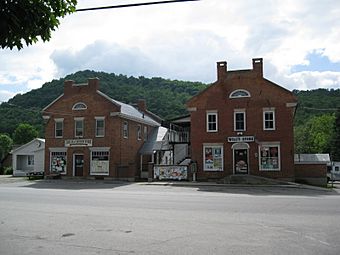Chelsea Village Historic District facts for kids
Quick facts for kids |
|
|
Chelsea Village Historic District
|
|
 |
|
| Location | N. and S. Main, Jail, School, Court and Church Sts., Maple and Highland Aves., Chelsea, Vermont |
|---|---|
| Area | 65 acres (26 ha) |
| Architectural style | Greek Revival and other styles |
| NRHP reference No. | 83003212 |
| Added to NRHP | September 29, 1983 |
The Chelsea Village Historic District is a special area in Chelsea, Vermont. It's the old village center and the main town for Orange County. This district became important in the early 1800s. It was a busy place for services and travel in the region.
You can see many buildings here that are in the Greek Revival style. These buildings were built mostly between 1830 and 1850. Later, other important buildings were added, like the town hall and library. The Chelsea Village Historic District was added to the National Register of Historic Places in 1983. This means it's a very important historical site.
Discovering Chelsea Village's Past
The town of Chelsea grew up along the First Branch White River. This is in the middle of Orange County. People first settled here in 1784. Chelsea became the county seat in 1795. A county seat is the main town where the county government offices are located.
In the 1800s, Chelsea became a service center for nearby farms and towns. It also had small factories. These included mills for making cloth, grinding grain, and cutting wood. Most of these old mills are gone now. The town grew the most between 1830 and 1850. This is why many buildings here are in the Greek Revival style. This style was very popular back then.
How Chelsea Village Was Built
The village is mostly laid out north to south. It follows what is now Vermont Route 113. In the 1800s, this was a busy road for stagecoaches. The center of the village has two town commons. These are like public parks or open spaces. Jail Brook and some buildings separate the two commons.
The north common was created in 1794. It was used for public gatherings and military training. The south common was given in 1804. This was the spot for the county courthouse.
Important Buildings and Styles
Around the commons and along Main, Maple, and Jail Brook Streets, you'll find many old buildings. Most of these are homes. They are built in the late Federal and Greek Revival styles. Some old shops from that time are still here too.
Two very important buildings from this period are the courthouse (built in 1847) and the Congregational church (built in 1848). Both are beautiful examples of the Greek Revival style. Later, in the 1890s, the town hall and library were built. These buildings show a different style called Romanesque Revival.
 | Toni Morrison |
 | Barack Obama |
 | Martin Luther King Jr. |
 | Ralph Bunche |



